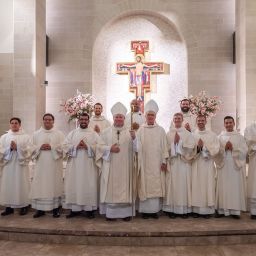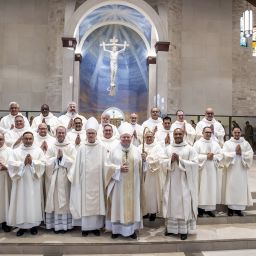From staff and wire reports
With St. Patrick’s Day falling on a Lenten Friday this year, Bishop Edward J. Burns has issued a dispensation from abstinence on March 17, allowing the faithful to enjoy the American Irish tradition of eating corned beef (or ham) and cabbage in good conscience.
“Because the Memorial of St. Patrick is a common celebratory day in the United States and locally,” Bishop Burns wrote in a rescript granting the dispensation on March 3, “I hereby decree that on Friday, March 17, 2023, all Catholics of the Diocese of Dallas, no matter where they may be, and all other Catholics actually present in the diocese on that day, are dispensed from the obligation to abstain from meat.”
In the announcement, the bishop noted that Catholics are not required to utilize the dispensation and may continue the laudable practice of abstaining from meat on this Friday of Lent. If one chooses to make use of this dispensation, he or she is strongly encouraged, though not required, to alternate or substitute another penance in place of abstinence from meat.
A number of bishops across the U.S. joined Bishop Burns in offering a dispensation for March 17. Some bishops also have added some “meat” to those orders by commuting, rather than dispensing with entirely, the obligation — making it conditional upon performing acts of prayer and charity and giving Catholics something additional to chew on in the process.
The dispensation, provided for under Canon 87 of the Code of Canon Law, aim to balance the festive nature of the day — an optional memorial in the church’s Roman Calendar — with the penitential season of Lent, during which Catholics ages 14 to 60 are required to abstain from meat on Fridays.
In making a similar announcement to that of the Diocese of Dallas, Bishop David A. Zubik of Pittsburgh pointed to “the great impact which St. Patrick has made not only on the people of Ireland, but especially in our own diocese.”
Many bishops were careful to stress the need to retain a Lenten spirit amid celebrations of St. Patrick. Patricius, a Romanized Britain of the fifth century, was enslaved by Irish raiders for six years, experienced a personal conversion, and then returned to evangelize that land’s pre-Christian peoples with the Gospel. In his “Confessio,” St. Patrick wrote that as a youth he “would pray up to one hundred times” a day, “and at night perhaps the same.” The “Apostle of Ireland” laid the groundwork for Christianity to take root among the Irish, countless numbers of whom ultimately brought the Catholic faith to different parts of the globe over the centuries.
Archbishop Jerome E. Listecki of Milwaukee said while “feast day in the church means what it says … (and) calls for celebratory feasting,” Catholics observing St. Patrick’s Day “are encouraged to engage in another sacrificial or charitable act that day or give up meat on another day.”
Similarly, Bishop John P. Dolan of Phoenix said that “all who make use of (his) dispensation are to engage in another sacrificial or charitable act that day.”
Bishop Kevin C. Rhoades of Fort Wayne-South Bend, Indiana, was even more specific, declaring faithful in that diocese may substitute the normal abstinence with attending Mass, praying the rosary for world peace, or spending half an hour in prayer before the Blessed Sacrament.
Catholics in the Diocese of Cleveland are being asked by Bishop Edward C. Malesic to “select another non-Friday day during Lent to abstain from eating meat, or to make some offering on behalf of the poor, whether by prayer, fasting or almsgiving in order to recognize and honor our Lord’s mission and passion for the sake of the salvation of souls.”
Bishop Earl K. Fernandes of Columbus, Ohio gave some of the most detailed conditions for his dispensation, requiring faithful to choose among making a pilgrimage or visit any church in that diocese named in honor of St. Patrick; assisting at Mass on March 17; praying the “Breastplate of St. Patrick” prayer (attributed to the saint); engaging in a pious devotion such as the rosary, the Stations of the Cross or Eucharistic Adoration; or “(performing) an act of comparable penance,” such as abstaining from meat at some point during the third week of Lent.
Gina Christian of OSV News contributed to this story.
Organization Chancellor Rescript Diocese of Dallas 230303000[6] by The Texas Catholic on Scribd















